 |
 |
|
| For The Latest News |
|
|
| Click on icon above. |
| Chris Andreae's "Get This" News at KBOO |
|
|
| Click on the icon above. |

CascadiaPublicRadio
|
 |
|
What or where is Cascadia?
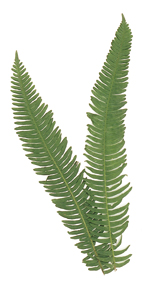 Nestled between the North Pacific Ocean and the Continental Divide of the North American Continent
lays a complex region formed from ongoing geological events and continuous climatic factors. Several regional mountain ranges
catch the moisture of the Pacific as it passes on its way east. The Columbia, the Willamette and the Frazer rivers with their
contributaries and other riparian systems cut through the basalt and granite mountains of this region providing rich alluvium
soil. The region can be defined by this great water cycle that is powered and fed back into the Pacific Ocean. All the regional
rivers, streams and creeks eventually flow back towards the Pacific. The region's farthest eastern frontiers lay on the western
slopes of the Rocky Mountains where the spring melt begins its return to the Pacific. This is a region rich in biodiversity,
history and cultures. It is a land that is shaped by geologic, oceanic, climatic and perceptional forces.
Today sociologists, geographers and ecologists are redefining regions based on the commonality of the ecological systems and
the human interactions within geographic systems called bioregions. The NE Pacific Ocean to the continental divide is called
Cascadia. The Cascadian bioregion encompassing the territories of the Alaskan Panhandle, British Columbia, Idaho, Washington,
Oregon, northern California and western Montana as well as very small portions of nearby states and provinces. Cascadia is
geographically the Columbia River Watershed and the area around the Cascade Range. Cascadia's farthest extent is from northern
California to the Alaskan Panhandle and from the Pacific to the Continental Divide.

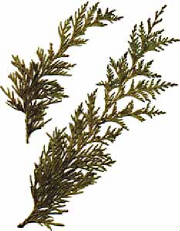
Eco
Cult
Revisiting 'Ecotopia' 30 years later
By Pat Joseph
In the afterword to the 30th anniversary edition of his 1975 novel Ecotopia,
author Ernest Callenbach writes, 'Looking back, it seems clear that Ecotopia was the first attempt to portray a sustainable
society, and that this, more than its modest literary merit, explains its durability.' Sadly, there is no false humility in
that statement.

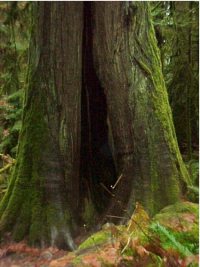
TURF: THE GREEN DREAM
The Man Who Invented Ecotopia
Author Ernest Callenbach talks about localism, the future, and the state of Ecotopian ideals.
The following is an extended, edited version of Geov Parrish's interview with Ecotopia author Ernest Callenbach on
the 30th anniversary of his futuristic novel about Pacific Northwest secession. The story is told from the perspective of
an American reporter, William Weston, who is one of the first outsiders allowed into Ecotopia some 20 years after Washington,
Oregon, and Northern California have successfully separated themselves from the rest of America to form a new country. What
he finds is an alternative universe, a place that is socially progressive, hardworking, and connected to nature. It is a society
without the internal combustion engine but with maglev trains. It is, in many respects, the first picture of how a modern
society could be restructured around environmental principles, and in that, was both reflective of its era and a road map
for future ecologically aware development. Ecotopia proved to be a seminal book. Not only did it sell nearly 1 million copies
in nine languages and generate a sequel, it became something of a utopian manifesto for the green movement, including the
German Green Party. Today, at age 75, Callenbach is retired from his day job at University of California Press, where he was
founder and editor of Film Quarterly. He lives and writes in Berkeley, Calif., where Geov Parrish talked with him by phone.
He, like his fictional character William Weston, offers his observations on the Ecotopian phenomenon, how far it's come, and
where it is likely to go in the years ahead.–The Editors at the Seattle Weekly (seattleweekly.com).

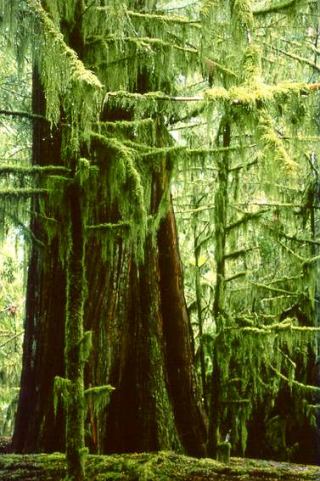
Another reason for Cascadia! (makes good economic sense!)
Why do we Cascadians remain in this economic tragedy? We pay more in federal taxes and get back less. We have more
national gaurd causalties than most parts of this corporatist system. Our lands and forests (our Mother) are seen as the profits
of others. Our resources and commons are bottled, plastic wrapped, packaged, exported-to-be-imported and remarketed to be
sold to us as something "owned" by filthy rich elite often from outside of Cascadia. We fear that our rights as states will
be usurped by people who do not value our way of life or worldview such as the Oregon's Death with Dignity law or the repeated
attempts to legalize pot. We watch as Fascists in the Whitehouse plan and plot the division of Cascadia by planting the seeds
for gerrymandering western and eastern Washington or purposing the gerrymandering California or adding more restrictions along
the US-Canadian border that divides Cascadia internationally.
After the election fraud many individuals proclaimed "secession". That the various "blue" states should divorce either
because the corporatists placed their first choice on the thrown of the the Amerikan Imperial system or because the "red"
staters were so stupid to allow it to happen and even like lemming followed their "fearless" leader.
Well... lets
face it there are two other major reasons to divorce the abusive Amerikan system. The first should be to use this as a stepping
stone for a massive cultural paradigm shift that switches us from a consumeristic and anthropocentric worldview to a community
based and eco-centered worldview. The second one (which relates to the post) is economics! This ship is sinking fast boys
and girls! Please stay calm and proceed to the exits to your left and right making sure to help your neighbor with any assistence
in the floation device that has been place under your seat. Please leave items and luggage behind as we exit the vessel. The
"Pacific NorthWest" (here after should now be referred to as Cascadia or the "NorthEast Pacific") during the 1990s was the
one of the main economic power houses of the Amerikan Empire if not the world. The NorthEast Pacific in the not to distant
past was one of the vanguards of ecological awareness and over the last few decades slipped as outside coorporate interests
eroded and divided public talk of sustainablity.
Of course the plastic faces that scare the television at 5:00 on
the local channels and the 24 hour channels will tell you "Oregon is rebounding" or "jobs are up in Washington" while they
pretend oil prices will not effect transportation of food or even food manufacturing/harvesting with machines.
What
the "experts" neglect to mention is that the Amerikan Imperial dollar was based on speculation. Speculation that new technology
in the pharmeceuticals, computers, engineering and many other cutting edge stuff. And they also neglect to mention that it
was on the labour of the foreign graduate students that had the lower education in mathmatics to do graduate level research.
Many of these potential students now are looking to other counties because of several reasons. One is that the universities
and colleges are in constant budget cuts that have increased since the Bush group has robbed the federal government (deverting
taxpayer money from the normal infrastructure to huge private military contracts and faith based groups). Another is that
federal funded research at universities now have a stigma of being anti-science because of the Bush stand on stem cell research
and evolution. This means that alot of research will now go to Europe, Australia, India or China. Added to this is the fear
of coming to the USofA because racism in the post 9/11 world. All this means is that the Amerikan dollar which was strong
due to speculation on cutting edge technology will loose that association especailly as the European Union and India take
the lead of the scientific world.
So this is what we NEED to do is start focusing on local economy ideally sustainable
and obviously locally owned (preferably co-operatives where we all empower our local stores). We can start this with simple
memes "Support Local Economy" and "Proud to be Cascadian". Obviously Wal-Mart and the fact that PGE is not owned by the people
are examples of the economic imperialism that has stolen not just local economy, but resoucres, livelyhoods and collective
self-esteem in smaller communities.
articles with URLs that are related...
This along with other articles were posted in Portland Indy Media in April of 2005.

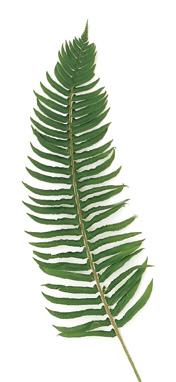 Cascadia: More than a dream
The notion that the continent's west forms a natural bloc has deep roots -- now powerful forces are joining to make it true.
It's always been more a state of mind than a tangible place on a map. Yet the empire of Cascadia, what some dreamers have
long believed the westernmost states and provinces of North America might one day be called if they ever banded together,
may not be quite the fantasy it once seemed.

Continentalism of a Different Stripe
Are Canadian provinces and the blue states in the U.S. quietly forging a radical new North American Union ? This American
says, "Yes."
by Jeremy Rifkin
There is an old saying in real estate-location, location, location. No sooner had the 2004 presidential election been
decided than maps began appearing all over the Internet, recasting the North American landscape into two distinct political
and cultural regions, with Canada and the Northeast, upper Midwest, and West coast states all coloured in blue, and the rest
of the continental United States coloured in red. Although the intent was sardonic, what if the jest did indeed have political
legs and there was a very real possibility of redrawing the political map of the continent?

Cascadian Images

cascadia cascadia cascadia cascadia cascadia cascadia cascadia cascadia cascadia cascadia cascadia cascadia cascadia cascadia
cascadia cascadia cascadia cascadia cascadia cascadia cascadia cascadia cascadia cascadia cascadia cascadia cascadia cascadia
cascadia cascadia cascadia cascadia cascadia cascadia cascadia cascadia cascadia cascadia cascadia cascadia cascadia cascadia
cascadia cascadia cascadia cascadia cascadia cascadia cascadia cascadia cascadia cascadia cascadia cascadia cascadia cascadia
cascadia cascadia cascadia cascadia cascadia cascadia cascadia cascadia cascadia cascadia cascadia cascadia cascadia cascadia
cascadia cascadia cascadia cascadia cascadia cascadia cascadia cascadia
cascadia cascadia cascadia cascadia cascadia cascadia cascadia cascadia cascadia cascadia cascadia cascadia cascadia cascadia
cascadia cascadia cascadia cascadia cascadia cascadia cascadia cascadia cascadia cascadia cascadia cascadia cascadia cascadia
cascadia cascadia
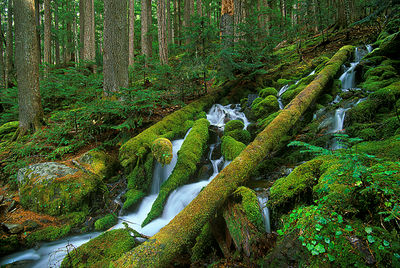
|
|
 |
 |
|
| click on icon to go to Cafepress.com |
|
|
| CAS oval (euro-style) sticker |
| click on icon to go to smALL FLAGs |
|
|
| Bioregional Cascadian Flag (nicknamed Doug) |
|
|
 |
|
An international economic relationship? A republic? A bioregion? A cooperative commonwealth? A network of communities based
on mutual aid? A utopia?
Cascadia is a lot of things to a lot of different people. Some people see Cascadia as just a bioregion while others envision
a republic or a commonwealth. Some see Cascadia as an ecological utopia waiting to awaken while others see Cascadia as one
clear-cut after another between petroleum driven suburbia and sprawling shopping malls. To anyone truly looking or experiencing
what Cascadia is then knows that Cascadia is many things with many possiblities.

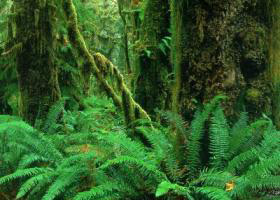
|
|
Ecology & Community: The
Bioregional Vision
by David Mc Closkey
“…I’ve been watching Seattle slip-slide away in Puget Sound for four months now,
from late December to late April…
…The pure, predictable power of these swollen rivers of mud builds up an enormous hydraulic
head until it finally bursts forth in a torrent of debris, clearing everything in its path…
…Our human contribution to the acceleration of such problems is enormous. Consider how we have
altered Seattle’s landscape: paved surfaces, flattened hills, rerouted or killed springs and creeks, channellized and
diked rivers, filled in wetlands, built everywhere, stripped away the native vegetation, expunged the fauna, and introduced
exotic species…
…We need to wake up and return to our senses, as if from a long, drugged sleep…The very
ground on which we stand seems to be washing out from under our feet… |

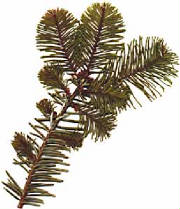
History
Cascadia like many places and people are the victims of the history telling
of those who have power. Today Cascadia or the Oregon Country has much history not told or pushed under the rug of ignorance,
assumption and rewritten for the American national mythology.
George Orwell in his classic dystopia, 1984, wrote of this control of
the people's collective identity and self-determination by control of their history:
"'Who controls the past,' ran the Party slogan, 'controls the future:
who controls the present controls the past.'"
Cascadia has much history that is either untold or remanufactured in order to keep
the status quo of empire or image of the American Nation-State.

Cascadian English?
Does Cascadia have a unique linguistic legacy as well as a unique dialect? Historically I would say yes. When you look at
the lingustic history of the region and at the use of the dominant language with its unique elements I would say yes there
is a distinct Cascadian English.
Which is very 'Copacetic'
"Chinook, for a century the International Language of the Pacific Coast, from Northern California to Alaska, from
the Pacific Ocean to the Rocky Mountains." ~J.M.R. Le Jeune's "Chinook Rudiments"
Le Jeune, J.M.R. (May 3 1924)
http://chinookjargon.home.att.net/ljcr24.htm

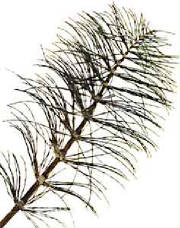
Welcome to Cascadia
Sunday,
November 14, 2004
STEVE WOODWARD
Nearly three decades before the 2004 elections, author Ernest Callenbach asked a prescient question: If we Oregonians, Washingtonians and Northern
Californians were in charge,
what would we do?
This was an article
originally published in the Oregonian on Sunday, November 14, 2004. Written by Steve Woodward after the November
2nd 2004 Presidential Election.

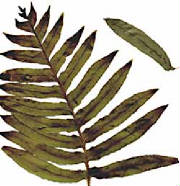
Time to Revive Cascadia
That red/blue map of American politics invites new borders. Remember 'Ecotopia?'
Mon., Mar.
21, 2005
By Christopher Key
During my recent interview with CTV talk show host Vicki Gabereau, I mentioned the concept of Cascadia. Gabereau
asked me to explain even though the interview was about my desire to move to Canada, a country I see as more compatible with
my own political and social philosophy.
This was an article originally published in TheTyee.ca in March 2005.

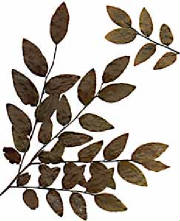
Why we must unite and support our small farmers of Cascadia
|
Conversations Among Farmers
Editor's note: This is the first post from
guest contributor Tim Steury, who edits Washington State Magazine in Pullman, Washington, and works a small farm just south
of Potlatch, Idaho.
|
|
At one time Oregon and the Pacific NorthWest was more unified because of concern
over losing valuable agricultual land. I think we must go back to that focus! We must help our small farmers. Support organic
not chemically induced fertilizers. Stop the loss of prime agricultural land to land develpoers (if not turn back suburban
sprawl). Replant trees as barriers from run off and erosion. And now with the low snow pack and lack of normal rain fall we
are in "Big Shit" (sorry for the blunt Anglo-Saxon) of trouble! Earlier this week I read an article posted in this indy about
Ecotopia and was reminded of Oregon "back in the day" when pro environment was part of the political dialogue for all the
political parties. What was in that article was:
"Callenbach only paid passing attention to agriculture in Ecotopia.
But in Oregon, it is the root and the soul of secessionism. Keep in mind, SB 100 was crafted by a rural dairy farmer, Hector
Macpherson, and ramrodded through by Gov. Tom McCall—both Republicans—and passed by a legislature controlled by
urban Democrats. It was, first and foremost, a farmland preservation act. No more compelling evidence of its success can be
found than by comparing South King County to the Willamette Valley. Sitting in the shadows of volcanos, both valleys are filled
with some of the richest soil in the world. Over the last 30 years, however, South King County has only grown industrial and
suburban sprawl. The Willamette Valley, its long-range form envisioned by landscape architect Lawrence Halprin during McCall's
tenure, sprouted world-class turf, wine, and nursery industries and a growing network of organic farms.
Originally posted in the CascadiaScoreCard's Blog on March 30, 2005. |

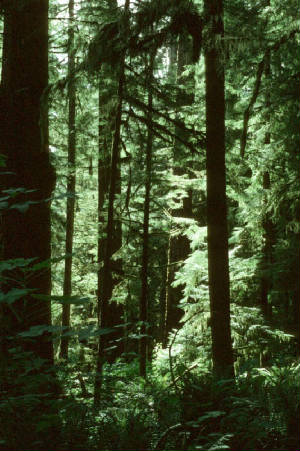
Welcome to the evergreen revolution
Public administration prof launches lecture series on Cascadia as a cross-border
region
by Matthew Gauk
The next time you undergo a three-hour wait at the delightfully misnamed
Peace Arch and the ensuing cavity search, try to remember that we’re all in it together.
Who's we? Us Cascadians, of course.
Cascadia
is the greater region of the Pacific Northwest and British Columbia, and the term carries with it the idea that the people
of these divided regions have common values and cultural traits.

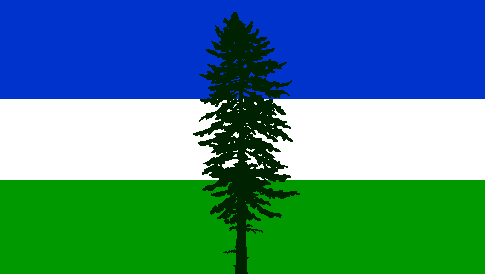
The Cascadian Flag or nicknamed "the Doug".
Recently the "Doug" (one of the popular versions of the flags representing the Cascadian bioregion) has been produced
by a flag maker. There is also a proposal to make the "Doug" out of hemp with natural dyes or out of recycled material.
UPDATE:
THERE WILL BE 4" x 6" FLAGS, 3" x 5" DOUG FLAG STICKERS, AND DOUG FLAG PATCHERS AVAILABLE.
KEEP POSTED FOR UPDATES ON PRICE QUOTES!
smALL FLAGs in Oregon City, OR (Cascadia)
You can send me an email to help organize a bulk
order, or you can contact smALL
FLAGs directly at email@smallflags.com

|
|